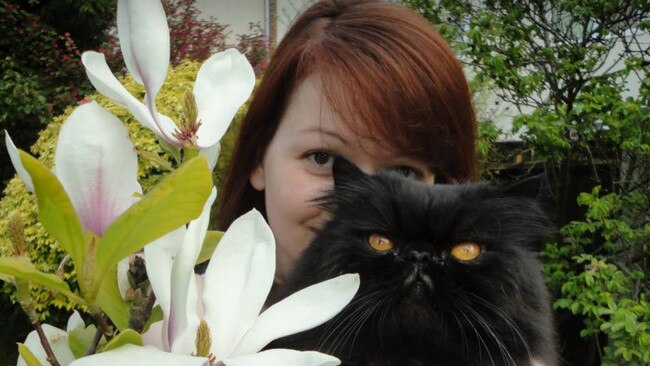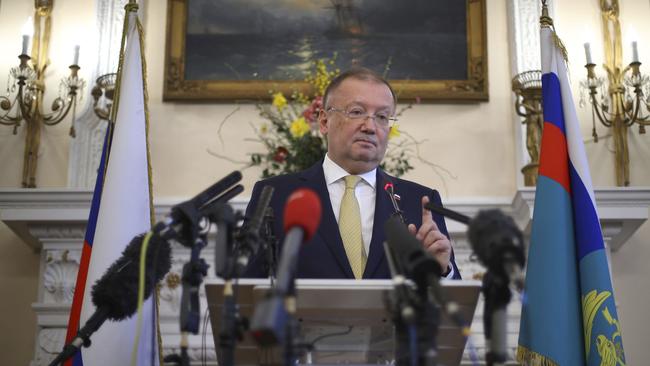Yulia Skripal speaks out about ‘disorienting’ poison attack
Russia tried to use the Skripal pets as proof it wasn’t behind the novichok attack. Westminster has just destroyed that argument.

Sergei Skripal and his daughter Yulia were not the only victims of the nerve agent attack that has left the former Russian spy in a coma.
The British government has confirmed that the novichok nerve agent also killed two of Mr Skripal’s pets and left another so distressed it had to be euthanased.
The Kremlin has consistently denied Britain’s accusation that Moscow is behind the attack on Mr Skripal and his 33-year-old daughter.
In a lengthy denial of the accusations last night (AEST), Vassily Nebenzia, the Russian Ambassador to the UN, claimed Britain was waging “a propaganda war” against Russia and compared the UK with Josef Goebbels, the Nazi propaganda master.
He also demanded to know what had happened to Mr Skripal’s pets — he had two guinea pigs and two cats — suggesting they would have suffered the same fate as the Skripals if novichok had been used.
“What happened to these animals? Why doesn’t anyone mention them? Their condition is also an important piece of evidence,” he said.
In response, a British government spokeswoman told AFP that Mr Skripal’s two guinea pigs had died and that a cat found in a distressed state was euthanized. She did not mention a second cat.
‘Disorientating episode’
Poisoning victim Yulia Skripal has described the attack on her and her father, former spy Sergei, as “a disorientating episode’’ and revealing that her strength is growing daily but stressing that she does not want Russian consular assistance.
Ms Skripal made her first public comment just hours after Russian television released a voice recording which was claimed to be between Ms Skripal and her closest relative, cousin Viktoria Skripal in Moscow. In the voice recording, which has not been verified, Ms Skripal says her father Sergei was resting and having a sleep and that she expected to be discharged from hospital soon.
”Everything is fine, everything is solvable, everyone is recovering and is alive,’’ she said in the Russian recording, made on the morning of April 5.
She said of her father: “Everything’s OK. He’s resting now, having a sleep. Everyone’s health is fine, there’s nothing that can’t be put right. I’ll be discharged soon. Everything is OK.’’
Soon after that tape was released, Scotland Yard issued a statement from Ms Skripal, who remains in Salisbury Hospital.
“I woke up over a week ago now and am glad to say my strength is growing daily,’’ she said in the statement.
“I am grateful for the interest in me and for the many messages of goodwill that I have received.
“I have many people to thank for my recovery and would especially like to mention the people of Salisbury that came to my aid when my father and I were incapacitated. Further than that, I would like to thank the staff at Salisbury District Hospital for their care and professionalism.
“I am sure you appreciate that the entire episode is somewhat disorientating, and I hope that you’ll respect my privacy and that of my family during the period of my convalescence.”

The recovery of the 33 year old and possible improvement in the condition of her double agent father, has raised question marks about the use of Novichok, one of the most deadly chemical nerve agents and whether an antidote was used.
Her remarkable improvement comes a month after being found in a catatonic state on a park bench, and several weeks after a British court that both Skripals were in comas and receiving round the clock care.
The British Foreign Office says Ms Skripal, a Russian citizen, had not taken up the offer to receive Russian assistance.
The Russian ambassador to the United Kingdom, Alexander Yakovenko told a press conference at his London residence that Russia had never made Novichok and had never stocked it. He pointed the finger elsewhere, saying the US first produced Novichok in the 1990s.
“It is nothing to do with Russia. We never produced it, we never had Novichok,” he said. “This is a creation of some other countries and some scientists.”
He welcomed the improved health of the Skripals, but was critical about Britain’s refusal to allow Russia wasn’t allowed to visit them or be involved in a joint investigation.
”We are very sorry for them, they are our people,’’ he said.
He said Ms Skripal would return to Moscow where she has a flat and a job, and he “had no problem’’ with her father.
But he was perturbed by the lack of response by the British foreign office. “Their telephones are switched off,’’ he said.
Mr Yakovenko defended Russian President Vladimir Putin, insisting that reporting of a comment attributed to Mr Putin that “traitors would kick the bucket’’ was false.
Mr Yakovenko insisted that Russia would not recognise the findings of the Organisation for the Prohibition of Chemical Weapons — due in a week’s time — because the OPCW did not include experts from Russia. But he called on Britain to release the OPCW findings in the interests of transparency.
Mr Yakovenko said the majority of the world didn’t support Britain, claiming it was only NATO and European countries, along with Australia that had supported the British claim that Russia was behind the poisoning.
“We take everything very seriously. For us, it is not a joke,” Mr Yakovenko said.




